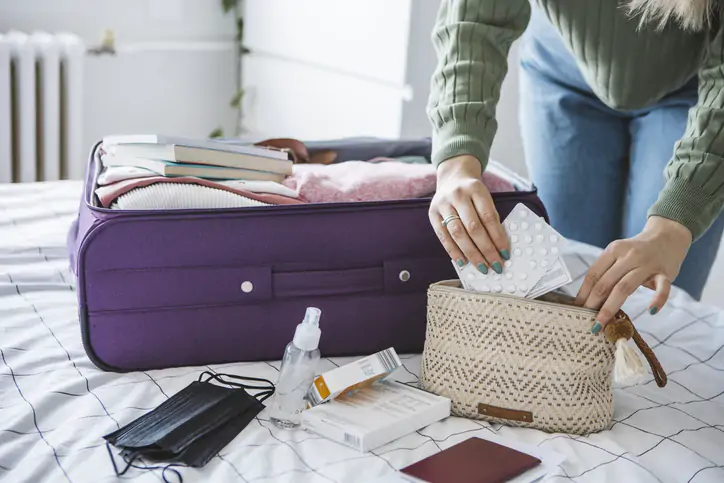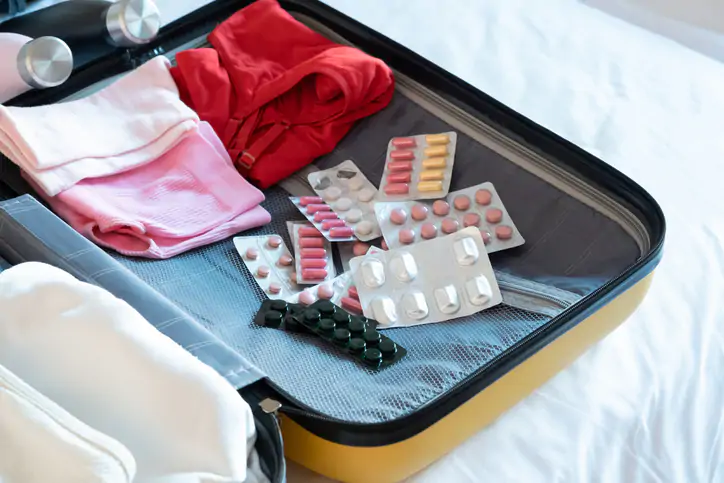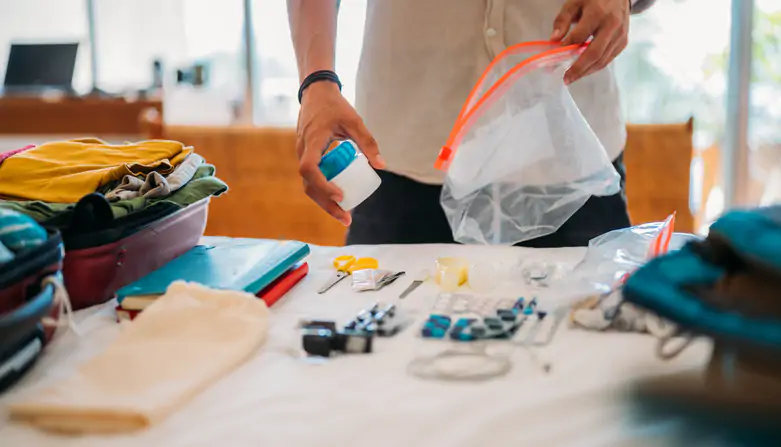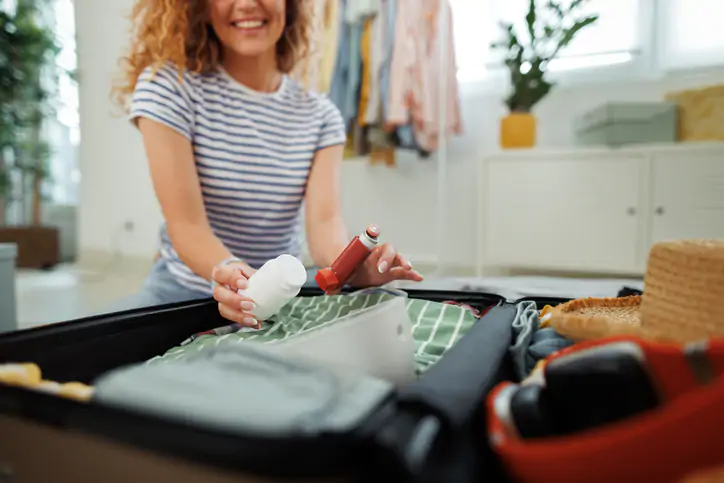Your medication plays an important role in keeping you well, so it deserves the same care and attention as your passport or boarding pass. But knowing how to travel with it – from what’s allowed through security to how to store it safely – isn’t always straightforward.
That’s why we’ve put together this expert guide, covering everything from packing tips to paperwork, plus what to do if your medication needs to be kept cool or comes with special requirements.
Before you book
Before you click “book” or “buy”, it can be useful to check whether you’ll need any documents or permissions to take your medication with you.
Check your destination’s rules
Some countries have strict rules about bringing medication (even those routinely prescribed in the UK) across their borders.
For example, the United Arab Emirates and Singapore take a zero-tolerance approach to unauthorised controlled drugs, including some painkillers, sleeping tablets, ADHD treatments, anti-anxiety drugs and medicines containing codeine. Elsewhere, in India, Egypt, Indonesia, Turkey and Thailand, certain medicines can only be brought in with prior approval or an import licence.
It’s a good idea to review your chosen destination’s rules well in advance. Embassy websites usually list restricted medicines and explain how to apply for permission if needed. And don’t forget to check the regulations for any countries you’re transiting through – restrictions can apply even if you’re only passing through the airport.
If approval is required, allow plenty of time. Processing can take several days, or longer in some cases.
Get a doctor’s letter if needed
If your medication could be restricted in the country you’re visiting, or if you’re travelling with controlled drugs or needles, it’s wise idea to carry a doctor’s letter signed by your GP and dated close to your time of travel. In some places, this might be a requirement. In others, it can simply make it easier to explain what you’re carrying if asked.
Your letter should confirm that the medication has been prescribed to you and explain why you need to take it. It should also list the medicines you’re carrying, including their generic names (not just brand names), and any equipment such as syringes or needles.
Remember, many GP practices charge a fee for writing this type of letter, as it’s not part of routine NHS care.
How to pack medication for travel
Once you’ve checked what you’re allowed to take, it’s time to think about how to pack your medication for your trip.
How much medication do you need to take on holiday?
You might want to take more medication than you think you’ll need, so you’re covered if your trip is extended, disrupted or delayed. As a guide, aim to take at least one to two weeks’ extra supply, if possible. This gives you flexibility if flights are cancelled, borders close, or your return home is postponed.
If you’re taking medication that could be difficult to replace abroad, talk to your GP or pharmacist well in advance. They can advise whether it’s possible to issue a larger supply and will know if there are any limits on what can be prescribed or carried.
Prescriptions, paperwork and packaging
Where possible, take your medication in its original packaging with the dispensing label still attached. This helps show that it’s been prescribed to you and makes it easier to answer any questions at customs or airport security. It will also help reduce the risk of confusion if you need medical help while you’re away.
You should also carry a copy of your prescription in case you need to replace lost medication during your trip. If your medicine has a different brand name abroad, having the generic name on your prescription or paperwork will help local pharmacists identify the right product.
Where to pack your medication for travel
Always pack your essential medication in your hand luggage, so it stays with you throughout your journey. This is especially important if you take medication that must be taken regularly, or treatments that are difficult to replace abroad.
For longer trips, or if you’re taking a larger supply of medication, experts often reccomend splitting your supplies between your hand luggage and checked bag where allowed, so you’re covered if one bag goes missing.
If you’re carrying liquids over 100ml, or medical equipment such as needles or syringes, check with your airline and each airport you’ll be passing through to confirm what documentation or packaging they require. Some airports may need you to show a doctor’s letter or prescription for medical liquids, and you may need to declare these items at security so they can be screened separately.
Taking medication with special requirements abroad
Controlled medication
Controlled medications are drugs that are subject to strict legal controls. Examples include (but aren’t limited to):
- Strong painkillers (such as those containing opioids)
- Anti-anxiety medication
- Sleeping tablets
- ADHD medication
- Epilepsy treatments
- Medicines containing codeine
If you’re not sure whether your medication is controlled, your GP or pharmacist can check this for you. You can also view the UK government’s controlled drugs list online.
UK guidelines state that travellers can carry up to a 3-month supply of certain controlled drugs (Schedules 2–4) for personal use without a licence, provided the medication is prescribed and carried with a doctor’s letter. For longer stays or exceptional circumstances, you might need to apply for an import licence from the Home Office.
Travelling with medication that needs to be kept cold
If you take medication that needs to be stored at a low temperature, such as certain insulin, biologics or hormone treatments, it’s important to plan carefully before you travel. Exposure to heat and humidity can damage sensitive medicines, making them less effective or unsafe to use.
An option for your journey is to carry the medication in an insulated cool bag or thermos-style container. These can help maintain a safe temperature for several hours, and are usually allowed in hand luggage. If you’re flying, check with your airline about their rules for carrying ice packs or gel packs through security.
Once you arrive at your destination, make sure you have access to a fridge that’s suitable for storing your medicine. If you’re staying in a hotel, contact them in advance to check whether a fridge will be available in your room. Most travellers avoid storing medication in a minibar, as they often don’t maintain a consistent temperature.
It’s also a good idea to carry a small digital thermometer so you can check that your medication is being kept within its recommended range during your trip.
Travelling with needles
If you need to take needles, syringes or other sharp medical equipment with you when you travel, a little extra preparation can help you avoid delays or questions at security. It also helps make sure you have everything you need for your treatment while you’re away.
Carry needles and syringes in line with the guidance we covered earlier on packing medication with specific requirements. Keep them in their original packaging where possible, and carry your doctor’s letter with them.
If you use pre-filled syringes or injection pens that contain more than 100ml, be aware that the same checks apply as with other liquid medication. As mentioned earlier, you may need to show supporting paperwork – such as a doctor’s letter or prescription – and declare the item at airport security so it can be screened separately.
When you arrive at your destination, it’s important to dispose of used needles safely. Many hotels or accommodation providers can help with advice on local disposal options. You can also take a small sharps container with you (these are available from pharmacies).
Final checks
Before you set off, it’s worth taking a few final steps to make sure you’re ready to travel with your medication:
Check expiry dates: make sure all your medication will be in date for the whole time you’re away, including any extra supply you’re taking.
Plan for emergencies: make a note of the nearest pharmacy and medical centre at your destination, just in case you need to replace lost medication or get advice while you’re away. If your medication is difficult to replace, consider carrying details of a local embassy or consulate who may be able to assist.
Check your travel insurance: make sure your travel insurance policy covers your medical conditions and any treatments you’re taking with you. If you’re carrying medication linked to a pre-existing condition, it’s important to declare this when buying your cover.
Ready to go?
When you take out travel insurance with Avanti, most pre-existing medical conditions can be covered. And if your prescription drugs or other essential medication are lost, damaged or stolen while you’re away, we’ll aim to help replace them as quickly as possible.
You’ll also have access to our 24-hour medical support line while you’re travelling. So if anything goes wrong, we’ll aim to put it right. That’s Travel Reassurance!
For full details of what’s included, you can read our policy documents here.
Get a quote with Avanti today.





